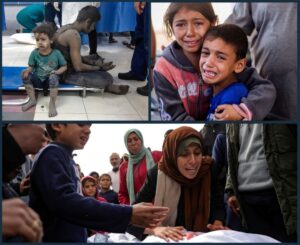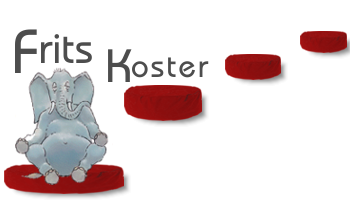 Silence is not always golden
Silence is not always golden
An open letter on relating to a humanitarian disaster
It will not have escaped anyone’s notice that a terrible humanitarian tragedy is currently unfolding in Gaza. Aid agencies are sounding the alarm. There are huge shortages of medicine, food and drinking water, and they speak of an acute emergency.
Despite this alarming situation, the Israeli regime led by Prime Minister Netanyahu continues its policy of ethnic cleansing and genocide unabated. Unfortunately, the Dutch government remains largely silent and still does not dare to speak out explicitly against this policy. Indeed, there is support economically, politically and militarily. Critical voices within the Buddhist (and also the secular mindfulness) world also remain largely absent so far. Remaining silent in the face of large-scale injustice or violence can contribute to its normalisation and strengthen the position of the oppressor. By not speaking up, we implicitly legitimise injustice – and become complicit through negligence.
With this article, we want to underline that a Buddhist approach to injustice can also mean that we do speak out critically and that it is not always enough to just ‘stand aside without judging’. In doing so, we want to make it explicit that our criticism is not aimed at all Jews or Israelis, but specifically at the genocidal policies of the Israeli government led by Netanyahu.1
Against the background of an enormous amount of information, we would first like to draw a summary picture of the suffering in Gaza. We do so using four key points, which parallel the four Noble Truths from Buddhism.2 The first key point is the recognition that genocide is taking place. Then, as the second key point, we explore the causes of this genocide and the causes of the painful silence about it from the Western world, including the Netherlands. By extension, we explore why there are so few critical voices even from Buddhist communities, and specifically within the Vipassana tradition as taught by Burmese monk Mahāsi Sayadaw (†1982). The third core issue focuses on perspective: the possibility of a ceasefire and non-violent coexistence of an Israeli and a Palestinian state. Finally, as a fourth key point, we address how we as meditators can consider this genocide and how we can practise non-violent ‘compassion-in-action’ in a anguished world.
1. A dramatic genocide is taking place in Gaza
On 7 October 2023, Hamas committed a terrorist attack in Israel, killing about 1,200 people and taking some 250 hostages. This violent act is certainly condemnable, and obviously Israel had the right to defend itself. Yet the response of the Israeli regime and army has become and still is completely disproportionate. Over a year and a half later, the death toll in Gaza exceeds 55,0003, while publications in the medical journal The Lancet last year indicated that the real number of Palestinian victims is probably much higher, with a very high proportion of women and children.4 More than 100,000 are wounded and most of all hospitals and schools have been destroyed-many under the pretext that Hamas fighters might be there. More than a million people have now been rendered homeless and Gaza’s infrastructure has been almost completely destroyed.
The humanitarian disaster is all-encompassing and has the contours of ethnic cleansing, using hunger as a weapon. A notable and controversial role in this is played by the Gaza Humanitarian Foundation (GHF), an initiative of the United States and the Israeli regime set up early this year to coordinate relief efforts. Traditional aid organisations and the United Nations argue that this aid has barely arrived and refuse to cooperate with the GHF because it does not meet basic criteria such as impartiality, neutrality and independence. Critics see the plan as a strategic means of forcing the Palestinian population to flee to southern Gaza; after all, three of the four distribution points are in the south. Last week, a UN commission concluded that Israel is guilty of “exterminating Palestinian life in Gaza”. In doing so, it classified the use of food as a weapon against civilians in Gaza as a war crime.
2.1. Causes of genocide in Gaza
The terrorist attack by Hamas on 7 October 2023 was a traumatic event that must be condemned without question. However, many sources emphasise that this attack took place against a backdrop of long-standing oppression of the Palestinian people. The term “apartheid” is regularly used in this context; Amnesty International claims that the Israeli government pursues a policy of favouring Jewish Israelis as much as possible in the occupied territories. This policy has resulted in structural racial discrimination, which is even enshrined in legislation. For example, Palestinian residents of Israel are often unable to obtain Israeli citizenship and therefore have a different legal status from Jewish Israelis. Palestinians living in Gaza and the West Bank are in many cases stateless. They are not allowed to settle freely in large parts of the country and where they do live, they often lack proper facilities. This structural inequality has led to economic deprivation and social exclusion. Therefore, Hamas did not come out of nowhere, but was partly born out of decades of unfair treatment and frustration at the hopeless situation.
At the same time, it must be stressed that by no means all Gaza residents support Hamas. In fact, the population finds itself between two warring parties, through no fault of its own in the conflict, and is thus the biggest victim of this situation.
Another important factor is Israel’s expansionist policy, which is not limited to Gaza but also visible in the West Bank. Prime Minister Netanyahu has developed over the years into a leader who, under the pretext of ongoing state of war, manages to maintain his position of power. It was also Netanyahu who unilaterally broke the ceasefire that had just been reached earlier this year. The International Criminal Court (ICC) has now charged both Netanyahu, former defence minister Gallant and Hamas leader Mohammed Diab Ibrahim Al-Masri5 with war crimes and crimes against humanity. Yet many Western countries hardly seem to be taking these accusations seriously.
2.2. Causes of the silence
Despite the extreme violence unfolding in Gaza, America and many European countries remain conspicuously silent. Also the Dutch government is barely speaking out.
Where does this remarkable silence come from? There are several possible explanations. First, among some traditionally Christian parties, an old-biblical belief is at play, in which the land of Canaan – including Gaza – is seen as the ‘Promised Land’ that God assigned to Abraham and his descendants. This religious notion fuels a strong, unconditional loyalty to Israel. In this light, criticism of Israel is quickly labelled anti-Semitic, effectively cutting off space for nuanced or justified criticism.
In addition, a deep sympathy for Jewish people emerged after the horrors of the Holocaust, which is completely understandable. At the same time, it is painful to see how this sympathy is sometimes used to condone or accept violent policies, reversing the historical victim role to a perpetrator role.
Economic interests and entanglements with Israel, even at university level, cannot be underestimated either. In addition, since the attacks on the Twin Towers on September 11, 2001, a deep-seated fear of and resistance against Islam has emerged in large parts of the Western world. European countries were quick to take a stand against Russia after the invasion of Ukraine, but they remain silent when an Islamic people like the Palestinians is slowly but surely being exterminated.
America continues to support Netanyahu, presumably because of economic and strategic interests. Many European nations follow the American position almost automatically, as if it were an older brother whose example one follows blindly.
Furthermore, social fear possibly plays a role. People are afraid of being accused of anti-Semitism or do not want conflicts with dissenters within family or friend circles. In this context, so-called whataboutism is also often used. Criticism of Israel is then not answered substantively, but diverted with questions like, “What about Hamas?” or “Why focus on Gaza and not on other conflicts in the world?” In doing so, the original criticism is not taken seriously, but trivialised or neutralised.
Finally, collective trauma can influence societal silence. In families of war veterans, it is often common not to talk about war experiences because of the pain it evokes. This mechanism may be repeated on a larger scale, leading us to live in a culture where silence is preferred to naming difficult truths.6
2.3. Silence in the Buddhist world
A remarkable silence is also noticeable within many Buddhist communities, including the Vipassanā tradition that we ourselves belong to. This silence contrasts with the engagement that there was earlier on abuses such as in Myanmar. How can this be explained? After some contemplation, we arrive at seven possible causes – some of which we also recognise in ourselves as pitfalls or gradually growing blind spots.
First, there is the emergence of a non-religious approach to mindfulness, which has been of undeniable value. Pioneers such as Jon Kabat-Zinn and Mark Williams have made important contributions to the integration of mindfulness into healthcare and education, including through programmes such as MBSR and MBCT. Thanks to their work, countless people with physical or psychological complaints have benefited from this practice. However, this development has also meant that the term ‘mindfulness’ in the public sphere has come to refer to something mainly about relaxation and self-regulation and is not so much concerned about ethics and compassionate engagement.
A second reason is the ideal of equanimity, which is elevated as an important aspiration within both secular mindfulness culture and Buddhist traditions. In this regard, the Buddha is considered the epitome of non-judgemental awareness. By extension, it is often argued that the issues in the Middle East are too complex to judge. Therefore, it is best to follow the Buddhist middle way and not get involved in politics and some teachers follow this very strictly. However, this reasoning fails to recognise that all our physical, verbal and mental actions have political dimensions. Ethical actions, including limiting ourselves or others, can actually be an expression of wisdom and compassion. By supposedly wanting to be non-political and not making judgements, we are in fact doing politics – and are complicit by our silence.
A third cause may lie in concerns about anger being negative. Many practitioners see anger as something low or unwholesome, something that does not fit within a spiritual attitude to life. This creates the idea that one should not get worked up over serious wrongs either. However, what is often overlooked is that there is also such a thing as wholesome anger – a moral indignation that stems from ethical awareness. Florence Nightingale once spoke of a “holy rage” that drove her to action, a deeply felt emotion in the face of injustice that can just as easily be part of a spiritual attitude to life.
The valuable qualities of acknowledging awareness and patience, which help us deal with difficulties, can also spill over. They invite giving space to discomfort, but can unintentionally lead to passivity. There is a risk of dwelling too long on complaints – or, more broadly, injustice – without taking action. If a house is on fire, it is not the time for prolonged reflection; it needs to be put out first. We also recognise this in our own practice: we ourselves waited a long time before we began to speak out clearly, and notice that this pattern is also present in many other practitioners.
A fifth factor is the possibility of existential wisdom being interpreted fatalistically. Within Buddhist psychology, much attention is paid to the universal characteristics of existence: impermanence, unsatisfactoriness and uncontrollability. These insights can help us find peace in a hectic world, but they can also lead to indifference if they are taken as a reason not to want to change anything more. In this context, it is helpful to recall the prayer attributed to the Spanish mystic Theresa of Avila: “May I have the serenity to accept what I cannot change, the courage to change what I can change, and the wisdom to be able to discern.”
Another factor is that meditators are often good adaptors. In practice, we learn to tune into what presents itself and seek harmony in it. This is valuable in itself, but can also lead to a pattern of silence in conflictual situations. A tendency towards neutrality can develop and a reluctance to speak out clearly, even when it is actually necessary.
Finally, the silence of American colleagues from the Dhamma community has been palpable for many of us. Many of us grew up with great respect for teachers like Jack Kornfield, Joseph Goldstein and Sharon Salzberg. They were – and are – important sources of inspiration for many. This is precisely why it was striking that from their corner there have so far been few critical voices about the violence in Gaza. In the past, they did manage to speak out forcefully: we remember, for instance, the images of Kornfield at a protest against the military regime in Myanmar in 2008, or Goldstein at a climate demonstration. Similarly, Anālayo bhikkhu’s contributions to the climate debate show an all-encompassing vision of the Dharma and its integration into daily life.
Therefore, we advocate naming the elephant in the room in this case too, with all the discomfort, doubt and not-knowing that may accompany it. We are therefore particularly grateful for the words of bhikkhu Bodhi, who does speak out strongly against the genocide in Gaza. In his essay “No Time for Silence” (July 2024), he writes: “In my understanding, equanimity should not stifle our capacity to make wise moral judgments or negate our obligation to act on the basis of clear ethical convictions. Equanimity can easily coexist with compassion and accompany conscientious action intended to rectify moral wrongs.7
3. Ending violence and striving for lasting peace
Ending violence and achieving a ceasefire by all parties involved is possible. More than that, it is necessary. It is also important to look again at lasting solutions in which both peoples can coexist peacefully. In our view, in addition to the already existing state of Israel, it is not unreasonable to work towards the creation of a Palestinian state.
4. What can we as meditators do to break the silence?
We do not want to condemn Dharma teachers who do not explicitly speak out about the genocide or do so only in general terms. After all, we can never fully fathom the inner motivations of others. At the same time, we ourselves feel the need not to look away, but rather to consciously break the silence, and to act from a moral compass. After all, compassion can also be active – not only in silence, but also in word and deed.
There are a variety of ways we can contribute, both through compassionate action and meditative practice . Anything done non-violently and with good intention, no matter how small, can help reduce violence and alleviate suffering.
4.1. Possible forms of compassion-in-action
Inform yourself widely, not just through mainstream channels such as NOS. Speak openly about the injustice and the scale of the genocide, name the perspective of a Palestinian state and underline the importance of outside pressure – also by the Netherlands, for instance through sanctions against the Israeli regime.
You could join organisations such as Liberation Circle, a forum of Buddhist practitioners calling for justice, compassion and ethical action.8
Consider donating to aid organisations active in Gaza, such as UNRWA, Oxfam Novib, Amnesty International and the UNHCR. Alternatively, on your birthday or other occasions, ask friends to donate to an organisation of your choice instead of a gift.
You could also participate in demonstrations and non-violent protests, sign petitions, send letters or e-mails to politicians and/or vote for a party that is clearly critical of Israel’s policies.
For politically active people, additional options include advocating for a trade ban with Israel, ending academic and military cooperation, and ending the arms trade.
Furthermore, you can contribute by making your voice heard online: post messages but be careful about the tone. Repost valuable contributions or give recognition through likes and supportive comments. Boycotting Israeli products, services and companies is another way to exert moral and economic pressure. The website www.bdsmovement.net offers concrete tools for boycott, divestment and sanctions campaigns, based on the premise that collective action raises awareness as well as puts pressure on policymakers.9
4.2. What meditation can do
Our meditation practice can form a supporting basis for acting from clarity and compassion. Instead of being overwhelmed by feelings of powerlessness, anger or sadness, we can acknowledge these with kindness and mindfulness. From that inner stability, we can choose more consciously how we want to contribute.
Within the eightfold path, it is ’right understanding’ that is mentioned as the first link. An important aspect of this is kammassakāta sammā-ditthi, the insight that each of us is heir to his or her actions – and also to the failure to act. From this insight, we can distinguish between what is beneficial and connective, and what is not. In this context, we believe that silence in the face of genocide is not beneficial.
Exercises like mettā or kindness meditation can help cultivate kindness – not just towards loved ones, but also towards people with whom you might experience conflict, or even world leaders. For example, you might wish Netanyahu and Hamas something like “May you develop wisdom and be free from violent intentions.” You might include all people involved in this humanitarian disaster, all the suffering souls and victims on both sides of the Gaza border.
Tonglen, which literally means “to receive and share”, can also be supportive. In this powerful form of meditation of Tibetan origin, we consciously breathe in a little of the suffering of others – for example, people in Gaza – and breathe out love, trust or hope.10
Enlightenment or awakening in this context could be seen as opening your eyes to what is really going on in the world, as well as daring to follow values such as compassion, justice and humanity.
If you are connected to a sangha or community of meditators, consider raising initiatives there that make room for reflection on the situation in Gaza and other places of violence. In the Netherlands, for example, in early July, the action Witnessing Gaza was set up, where the names of those killed in Gaza were read out non-stop – a silent but powerful testimony.
Finally, at the end of your meditation, you can do a traditional practice called in Pali pattidāna: sharing merit. Here, we dedicate the beneficial qualities of our meditation to people suffering violence and oppression – like the people in Gaza.
Perhaps a part of the last stanza from Naomi Shahib Nye’s poem Kindness (1995) offers a meaningful conclusion:
Then it is only kindness … that raises its head
from the crowd of the world to say
“It is I you have been looking for”
and then goes with you everywhere
like a shadow or a friend.
 This article was signed Monday 7 July 2025 by the following meditation teachers guiding Vipassanā retreats in the Netherlands and Belgium: Frits Koster, Joost van den Heuvel Rijnders, Katleen Janssens, Ank Schravendeel, Dingeman Boot, Ria Kea and Chris Grijns. May it serve and support all those suffering from the current violence in Gaza.
This article was signed Monday 7 July 2025 by the following meditation teachers guiding Vipassanā retreats in the Netherlands and Belgium: Frits Koster, Joost van den Heuvel Rijnders, Katleen Janssens, Ank Schravendeel, Dingeman Boot, Ria Kea and Chris Grijns. May it serve and support all those suffering from the current violence in Gaza.


